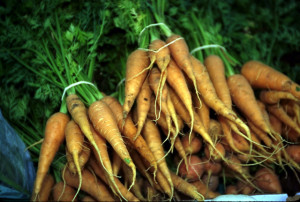That Extra Serving of Veggies Could Help Lower Your Blood Pressure
 Did you know that almost one third of all American adults have high blood pressure (hypertension)? This poses a significant issue as this “silent killer” has little to no discernible symptoms and significantly increases your chances of developing cardiovascular disease (CVD). The latest cardiovascular research has provided evidence in favor of adopting a vegetarian diet to help maintain healthier blood pressure levels.
Did you know that almost one third of all American adults have high blood pressure (hypertension)? This poses a significant issue as this “silent killer” has little to no discernible symptoms and significantly increases your chances of developing cardiovascular disease (CVD). The latest cardiovascular research has provided evidence in favor of adopting a vegetarian diet to help maintain healthier blood pressure levels.
(Quick fact: People should try and keep their blood pressure around 120/80 mm HG.)
Prior clinical studies have shown that a patient’s risk for CVD doubles with each increase of 20/10 mm Hg. At the same time, reducing that top value by 5 mm HG can lower your risk of CVD by nearly 7 percent. So what’s the best way to do that? The research points to eating more fruits and veggies.
Systolic and Diastolic Blood Pressure
Before you continue, here are a couple important terms worth familiarizing yourself with:
- Systolic Blood Pressure – This is that top value in a BP reading. This measurement shows the pressure in the arteries when the heart muscle is contracted (beating).
- Diastolic Blood Pressure – This is the bottom value in a BP reading. This measurement shows the pressure in the arteries while the heart is at rest (in between beats) and refilling with blood.
During this hypertension clinical trial, a team of researchers combed through data compiled from 7 separate clinical trials and 32 observational studies. This included information on nearly 21,500 clinical volunteers. These specialists wanted to see what the data had to say about the effects of a vegetarian diet on high blood pressure. There were several different vegetarian diets that were tested in these clinical studies:
- Vegan
- Semi-vegetarian
- Lacto-vegetarian
- Pesco-vegetarian
- Ovo-vegetarian
Interpreting the Results
 The participants in the 7 clinical trials who adopted a vegetarian diet had an average systolic blood pressure that was 4.8 mm HG lower than the participants on a omnivore type diet. These vegetarian participants also had a diastolic blood pressure that was 2.2 mm HG lower on average.
The participants in the 7 clinical trials who adopted a vegetarian diet had an average systolic blood pressure that was 4.8 mm HG lower than the participants on a omnivore type diet. These vegetarian participants also had a diastolic blood pressure that was 2.2 mm HG lower on average.
Incredibly, this difference was even more pronounced in the 32 observational studies. Vegetarian diets were linked to a mean BP reduction of 6.9 mm HG (systolic blood pressure) and 4.7 mm HG (diastolic blood pressure).
So what could explain the reported effects a vegetarian diet can have on your blood pressure? There are several factors which can explain this significant association:
- Vegetarian diets tend to be lower in things like saturated fats and sodium
- Vegetarian diets also provide more sources of potassium and fiber
- Vegetarians have lower body mass indexes (BMIs) on average since fruits and veggies are less energy dense — you can eat more and consume less calories
Do You Need to Become Vegetarian?
There were some limitations to these studies that are worth mentioning. For instance, not everyone has the same restrictions when they adopt a vegetarian diet. Several of the observational studies did not account for certain lifestyle factors such as drinking habits and fitness levels.
The data shows that you can help lower your blood pressure by adding more fruits and vegetables to an overall healthy diet. Additionally, you should try to remember the following tips to improve your long-term heart health:
- Limit the amount of sodium in your diet
- Exercise on a more frequent basis
- Avoid drinking excessively